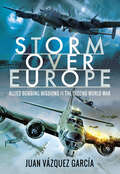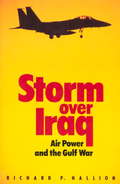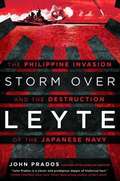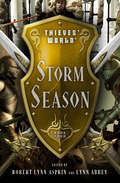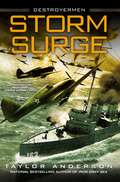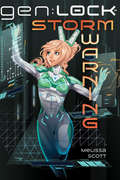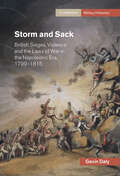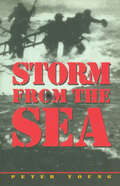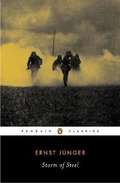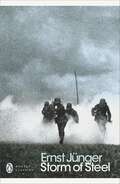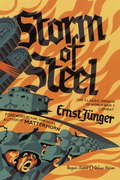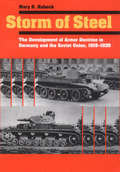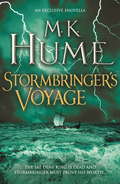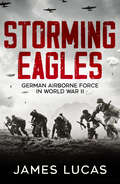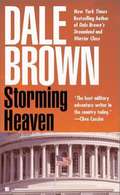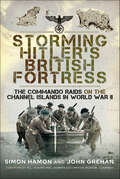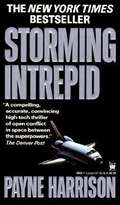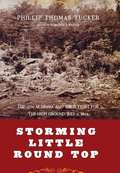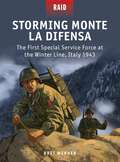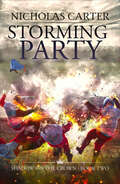- Table View
- List View
Storm Over Europe: Allied Bombing Missions in the Second World War
by Juan Vázquez GarcíaA view of British and American WWII bombing raids with over 250 color images, diagrams, and operational maps: “An excellent entry-level introduction.” —Air Power HistoryFollowing the Battle of France in 1940, British Bomber Command launched its response to the then-almighty Wehrmacht. Sadly, its beginnings were not at all promising: Its resources were limited and the twin-engine aircraft in service had a very limited load capacity, as well as being vulnerable to the Luftwaffe.The progressive entry into service of the great four-engine planes would change the situation, but the great problem of nighttime raids, such as correctly identifying targets and a precise launching of the bombs, would never be adequately resolved. This extensively illustrated history offers a detailed look at this aspect of military aviation history.
Storm Over Iraq
by Richard HallionAn incisive account of the Persian Gulf War, Storm Over Iraq shows how the success of Operation Desert Storm was the product of two decades of profound changes in the American approach to defense, military doctrine, and combat operations. The first detailed analysis of why the Gulf War could be fought the way it was, the book examines the planning and preparation for war. Richard P. Hallion argues that the ascendancy of precision air power in warfare--which fulfilled the promise that air power had held for more than seventy-five years--reflects the revolutionary adaptation of a war strategy that targets things rather than people, allowing one to control an opposing nation without destroying it.
Storm Over Leyte: The Philippine Invasion and the Destruction of the Japanese Navy
by John PradosThe story of the Battle of Leyte Gulf in World War II--the greatest naval battle in history. As Allied ships prepared for the invasion of the Philippine island of Leyte, every available warship, submarine and airplane was placed on alert while Japanese admiral Kurita Takeo stalked Admiral William F. Halsey's unwitting American armada. It was the beginning of the epic Battle of Leyte Gulf--the greatest naval battle in history. In Storm Over Leyte, acclaimed historian John Prados gives readers an unprecedented look at both sides of this titanic naval clash, demonstrating that, despite the Americans' overwhelming superiority in firepower and supplies, the Japanese achieved their goal, inflicting grave damage on U.S. forces. And for the first time, readers will have access to the naval intelligence reports that influenced key strategic decisions on both sides. Drawing upon a wealth of untapped sources--U.S. and Japanese military records, diaries, declassified intelligence reports and postwar interrogation transcripts--Prados offers up a masterful narrative of naval conflict on an epic scale.
Storm Season (Thieves' World® #4)
by John Brunner Joe Haldeman Philip José FarmerA whirlwind of fantasy action and adventure descends on Thieves&’ World®—as related by C. J. Cherryh, Diana L. Paxson, Andrew J. Offutt, and others. Welcome back to Sanctuary, &“the city where anything could happen, where characters created by some of the best fantasy writers of the generation crossed paths and shared adventures&” (Black Gate). The Thieves&’ World® series continues with a story line created by Robert Lynn Asprin, C. J. Cherryh, Diana L. Paxson, Lynn Abbey, Janet Morris, and Andrew J. Offutt. In Storm Season, immortal warrior Tempus Thales and his nemesis, the crime lord Jubal, go head to head in fast-paced exploits that bring the simmering tension between them to a boil. &“Much of Storm Season pertains to the conflict between Asprin&’s gladiator/crime lord Jubal and Morris&’ Tempus, and the other stories work to move this plotline along, while telling their own tales. Offutt, as usual, steals the show with a Shadowspawn story . . .&” —Fantasy-Faction
Storm Surge (Destroyermen, Book #8)
by Taylor AndersonIn Taylor Anderson's acclaimed Destroyermen series, a parallel universe adds an extraordinary layer to the drama of World War II, as Lieutenant Reddy and the crew of USS Walker, cast into that alternate earth, continue to fight the war that rages across the globe. In the Pacific, as USS Walker is repaired and updated after a previous battle and Reddy is healing from his wounds, planning begins for a bold raid on the very heart of the Grik Empire. But time is running out for the Alliance army in Indiaa, and the Allied forces in the west must gather in an unprecedented land, air, and sea campaign to destroy the mighty Grik battle fleet and break through to their relief. All other plans go on hold when the attempt proves more difficult--and more heartbreakingly costly--than anyone imagined. Meanwhile, the struggle continues on other fronts near and far: in the jungles of Borno in distant Southern Africa and in the Americas, where the Allies are finally learning the terrible truth about the twisted Dominion. The Alliance is on the offensive everywhere, but their enemies have a few surprises, including new weaponry and new tactics ... and a stunning geographic advantage that Reddy never suspected. Until now.
Storm Warning
by Jack HigginsEric Berger: A loyal German naval officer, he was torpedoed and rescued by a Portuguese freighter. Now, in Germany's darkest days, he's sailing a 19th-century ship from Brazil into the fires of war-for a chance to see his children again. Paul Gericke: The small German U-boat ace was a warrior's warrior. Ordered on a suicidal mission against the Royal Navy, he is taken prisoner-but his enemies may not be able to hold him. Harry Jago: A Yale dropout, he fought on PT boats in the Pacific and survived at Omaha Beach. Now he's twenty-five going on fifty, and headed for a mission that will change his life. Janet Munro: A beautiful, tough-talking American doctor, she has seen the worst of London's bombing terror. But when a Navy man gets her involved in a prisoner-of-war detail, she's facing a new side of war.
Storm Warning (Security Specialists International #4)
by Monette MichaelsFormer Army helicopter pilot DJ Poe is a woman used to working in a man’s world. So, the opportunity to become SSI’s first female operative is in her comfort zone. She just didn’t expect to feel an instant attraction for her boss’s brother-in-law. Intimate relationships with men had never ranked high on her bucket list.Stuart “Tweeter” Walsh knew he’d like DJ because she had saved one of his brothers’ life in Afghanistan and had been unofficially adopted into the Walsh clan. But when he sees the tall, leggy, blonde goddess he falls instantly in love. Now, all he has to do is convince the man-shy beauty to take a chance on him.Take one alpha-male geek add in one skittish female warrioress—throw them into close proximity and you have the perfect conditions for storm warnings ahead.
Storm Warning: An AFK Book (gen:Lock)
by Melissa ScottThe first-ever auiobook for gen:LOCK, the hit animated sci-fi series starring Michael B. Jordan, Dakota Fanning, David Tennant, and Maisie Williams!The last few months have been a whirlwind for Cammie MacCloud. Ever since she agreed to join the gen:LOCK program to help fight the Union, an authoritarian force threatening the world, she's been struggling to find her place in the group. As a 17-year-old genius hacker, she doesn't really fit in among the other four recruits: She can't shoot, she isn't the most graceful in the field, and her brash style doesn't exactly jibe with Command.But Cammie notices things the others don't, and she has the skills to investigate when something feels off... like their latest mission, which currently finds them stranded at the center of a deadly storm with a Union spy in their midst. Don't miss this epic, original novel from multiple award-winning author Melissa Scott and the gen:LOCK team!
Storm Watch: Storm Watch The Rule-breaker Wicked Nights (Uniformly Hot! Ser. #487)
by Jill ShalvisDon’t miss this scorching classic book fromNew York Timesbestselling author Jill Shalvis where a storm is just the beginning of the wild ride!After battling a hurricane of catastrophic proportions working for the National Guard, Jason Mauer badly needs some downtime. But during another deluge, Jason’s savior skills are suddenly in demand…by his hot friend Lizzy Mann. Jason knows it would be dangerous to let himself by swept away by the flash flood of desire and emotion he feels for Lizzy, particularly during an unpredictable storm. But can he resist the temptation?Originally published in 2009.
Storm and Sack: British Sieges, Violence and the Laws of War in the Napoleonic Era, 1799–1815 (Cambridge Military Histories)
by Gavin DalyDuring the Peninsular War, Wellington's army stormed and sacked three French-held Spanish towns: Ciudad Rodrigo (1812), Badajoz (1812) and San Sebastian (1813). Storm and Sack is the first major study of British soldiers' violence and restraint towards enemy combatants and civilians in the siege warfare of the Napoleonic era. Using soldiers' letters, diaries and memoirs, Gavin Daly compares and contrasts military practices and attitudes across British sieges spanning three continents, from the Peninsular War in Spain to India and South America. He focuses on siege rituals and laws of war, and uncovering the cultural and emotional history of the storm and sack of towns. This book challenges conventional understandings of the place and nature of sieges in the Napoleonic Wars. It encourages a rethinking of the notorious reputations of the British sacks of this period and their place within the long-term history of customary laws of war and siege violence. Daly reveals a multifaceted story not only of rage, enmity, plunder and atrocity but also of mercy, honour, humanity and moral outrage.
Storm from the Sea
by Peter YoungThis classic account is a dynamic and vivid record of what it was like to fight with Britain's Commandos across wartime. Peter Young, who joined 3 Commando in June 1940 and went into action with them in July of that year, sets down a spirited tale of adventure, heroism and ever-present danger in this valuable narrative of an elite force at war. Storm from the Sea is the commandos' story of war and describes a number of key Commando raids against targets in occupied Europe. The first amphibious operation of note was against the Lofoten islands and a second raid against Vaagso quickly followed. Despite a setback at Dieppe, the commandos continued to annoy the Germans with hit and run attacks and Peter Young's men participated in the invasion of Sicily and in operations in Italy until being recalled for D-Day. Hard fighting in Normandy followed and the author recalls the daily skirmishes and ambushes which, for the commandos, so typified the liberation of France. After a brief period attached to 3rd Commando Brigade in Burma, Peter Young ended his war preparing for operations in Malaya. The conflict had been a punishing adventure but, as he testifies in Storm from the Sea, his Army Commandos came through with a tremendous reputation for daring and stealth.
Storm of Steel
by Michael Hofmann Ernst JungerThe memoir widely viewed as the best account ever written of fighting in WW1<P> A memoir of astonishing power, savagery, and ashen lyricism, Storm of Steel illuminates not only the horrors but also the fascination of total war, seen through the eyes of an ordinary German soldier. Young, tough, patriotic, but also disturbingly self-aware, Jünger exulted in the Great War, which he saw not just as a great national conflict but—more importantly—as a unique personal struggle. Leading raiding parties, defending trenches against murderous British incursions, simply enduring as shells tore his comrades apart, Jünger kept testing himself, braced for the death that will mark his failure. Published shortly after the war’s end, Storm of Steel was a worldwide bestseller and can now be rediscovered through Michael Hofmann’s brilliant new translation.
Storm of Steel (Penguin Modern Classics)
by Ernst JungerPresenting the desperate conflict of the First World War through the eyes of an ordinary German soldier, Ernst Jünger's Storm of Steel is translated by Michael Hofmann in Penguin Modern Classics.'As though walking through a deep dream, I saw steel helmets approaching through the craters. They seemed to sprout from the fire-harrowed soil like some iron harvest.'A memoir of astonishing power, savagery and ashen lyricism, Storm of Steel depicts Ernst Jünger's experience of combat on the front line - leading raiding parties, defending trenches against murderous British incursions, and simply enduring as shells tore his comrades apart. One of the greatest books to emerge from the catastrophe of the First World War, it illuminates like no other book not only the horrors but also the fascination of a war that made men keep fighting for four long years.Ernst Jünger (1895-1998) the son of a wealthy chemist, ran away from home to join the Foreign Legion. His father dragged him back, but he returned to military service when he joined the German army on the outbreak of the First World War. Storm of Steel (Stahlgewittern) was Jünger's first book, published in 1920. Greatly admired by the Nazis, Jünger remained at a distance from the regime, with books such as his allegorical work On the Marble Cliffs (1939) functioning as a covert criticism of Nazi ideology and methods.If you enjoyed Storm of Steel, you might like Edward Blunden's Undertones of War, also available in Penguin Modern Classics.'To read this extraordinary book is to gain a unique insight into the compelling nature of organized, industrialized violence'Niall Ferguson, author of War of the World'Hofmann's interpretation is superb' The Times'Unique in the literature of this or any other war is its brilliantly vivid conjuration of the immediacy and intensity of battle' Telegraph'Storm of Steel is what so many books claim to be but are not: a classic account of war' Evening Standard
Storm of Steel: (Penguin Classics Deluxe Edition) (Penguin Classics)
by Michael Hofmann Karl Marlantes Ernst Junger Neil GowerThe memoir widely viewed as the best account ever written of fighting in WW1A memoir of astonishing power, savagery, and ashen lyricism, Storm of Steel illuminates not only the horrors but also the fascination of total war, seen through the eyes of an ordinary German soldier. Young, tough, patriotic, but also disturbingly self-aware, Jünger exulted in the Great War, which he saw not just as a great national conflict but--more importantly--as a unique personal struggle. Leading raiding parties, defending trenches against murderous British incursions, simply enduring as shells tore his comrades apart, Jünger kept testing himself, braced for the death that will mark his failure. Published shortly after the war's end, Storm of Steel was a worldwide bestseller and can now be rediscovered through Michael Hofmann's brilliant new translation.For more than sixty-five years, Penguin has been the leading publisher of classic literature in the English-speaking world. With more than 1,500 titles, Penguin Classics represents a global bookshelf of the best works throughout history and across genres and disciplines. Readers trust the series to provide authoritative texts enhanced by introductions and notes by distinguished scholars and contemporary authors, as well as up-to-date translations by award-winning translators.
Storm of Steel: The Development of Armor Doctrine in Germany and the Soviet Union, 1919–1939
by Mary R. HabeckIn this fascinating account of the battle tanks that saw combat in the European Theater of World War II, Mary R. Habeck traces the strategies developed between the wars for the use of armored vehicles in battle. Only in Germany and the Soviet Union were truly original armor doctrines (generally known as "blitzkreig" and "deep battle") fully implemented. Storm of Steel relates how the German and Soviet armies formulated and chose to put into practice doctrines that were innovative for the time, yet in many respects identical to one another.As part of her extensive archival research in Russia, Germany, and Britain, Habeck had access to a large number of formerly secret and top-secret documents from several post-Soviet archives. This research informs her comparative approach as she looks at the roles of technology, shared influences, and assumptions about war in the formation of doctrine. She also explores relations between the Germans and the Soviets to determine whether collaboration influenced the convergence of their armor doctrines.
Stormblood
by Jeremy SzalVakov Fukasawa used to be a Reaper: a bio-enhanced soldier fighting for the Harmony, against a brutal invading empire. He's still fighting now, on a different battlefield: taking on stormtech. To make him a perfect soldier, Harmony injected him with the DNA of an extinct alien race, altering his body chemistry and leaving him permanently addicted to adrenaline and aggression. But although they meant to create soldiers, at the same time Harmony created a new drug market that has millions hopelessly addicted to their own body chemistry. Vakov may have walked away from Harmony, but they still know where to find him, and his former Reaper colleagues are being murdered by someone, or something - and Vakov is appalled to learn his estranged brother is involved. Suddenly it's an investigation he can't turn down . . . but the closer he comes to the truth, the more addicted to stormtech he becomes.And it's possible the war isn't over, after all . . .
Stormblood
by Jeremy SzalVakov Fukasawa used to be a Reaper: a bio-enhanced soldier fighting for the Harmony, against a brutal invading empire. He's still fighting now, on a different battlefield: taking on stormtech. To make him a perfect soldier, Harmony injected him with the DNA of an extinct alien race, altering his body chemistry and leaving him permanently addicted to adrenaline and aggression. But although they meant to create soldiers, at the same time Harmony created a new drug market that has millions hopelessly addicted to their own body chemistry. Vakov may have walked away from Harmony, but they still know where to find him, and his former Reaper colleagues are being murdered by someone, or something - and Vakov is appalled to learn his estranged brother is involved. Suddenly it's an investigation he can't turn down . . . but the closer he comes to the truth, the more addicted to stormtech he becomes.And it's possible the war isn't over, after all . . .
Stormbringer's Voyage (e-novella): A short story of courage at sea
by M. K. HumeThe Sae Dene King is dead and Stormbringer must prove his worth... M.K. Hume's exclusive e-novella tells the dramatic story of how the Storm Lord became king of the Sae Dene. Prequel to The Storm Lord: Twilight of the Celts II, short story Stormbringer's Voyage is the perfect read for fans of Ben Kane and Ian Ross. When the king of the Sae Dene is murdered by treacherous Geats, his young son, Valdar Bjornsen, swears an oath of vengeance. But first he must learn the skills of the sea-faring warriors to prove he is a worthy heir to the throne.Setting sail on his father's ship, Loki's Eye, Valdar embarks on a voyage of pillage and murder that earns him the name of Stormbringer. When news of his triumphant conquest reaches Hrolf Kraki, the newly crowned king of the Dene, Valdar is summoned to take on a mission that will change his destiny for ever...What readers are saying about Stormbringer's Voyage: 'Well drawn characters with the right balance of plot and action. M.K. Hume has done it again. A great addition to historical fiction''Another cracking tale''I really enjoyed reading this book, with its steady progression to greater things. I can't wait to read the next'
Storming Eagles: German Airborne Forces in World War II
by James LucasUnstoppable and deadly, this is the gripping story of some of the most feared soldiers in the warThe daring, courage and skill of the highly-trained men who spearheaded German assaults in the blitzkrieg of 1940, dropping from the air to seize and overwhelm key invasion points, showed to an alarmed world that a new dimension had been added to the science of warfare.One spectacular success was the invasion and capture of Crete in May 1941, all be it achieved at a terrible price. The German paratroopers were an elite, justifying again and again their great reputation for courage and hard fighting in Russia, North Africa and Italy.Bestselling military historian James Lucas has researched deeply in Allied and German archives and interviewed many of the leading members of the Fallschirmjaegar who survived the war. This is an unmissable and dramatic account of the Second World War’s most frightening elite, perfect for readers of James Holland and Max Hastings.
Storming Heaven (Independent #4)
by Dale BrownAbused by American soldiers during an incarceration in Europe, Henri Cazaux has waited years to exact revenge on the U.S. He uses commercial aircraft to deploy bombs on major U.S. airports--killing thousands, halting air traffic, and creating national panic. Rear Admiral Ian Hardcastle and It. Col. Al Vincenti are ordered to reestablish security in the skies.
Storming Hitler's British Fortress: The Commando Raids on the Channel Islands in World War II
by John Grehan Simon HamonIn 1940 British forces were withdrawn from the Channel Islands, allowing the Germans to occupy British territory. Hitler was determined to hold onto what he saw as a valuable prize, and the islands were heavily fortified. However, despite being extensively defended, the occupied Channel Islands remained vulnerable to commando-style raids. Indeed, a total of nine such operations were conducted between 1940 and 1943. Many others were planned but never executed. Each one was a bold and dangerous expedition, with small groups of men daring to trespass on Hitler’s cherished British stronghold. The first of these attacks, Operation Ambassador, took place on the night of 14/15 July 1940. The second ever raid undertaken by the Commandos, it was focused on the island of Guernsey. Though the mission failed to achieve any of its objectives, valuable lessons were learnt. In the weeks, months and years that followed, raids were also undertaken against Jersey, Sark, Herm, Burhou and the Casquets lighthouse off Alderney. The final attack, Hardtack 22, was one of the three carried out against the German garrison on Sark. After the second mission, Hardtack 7, had to be aborted, the Commandos returned to the island on the night of 26/27 December 1943, tasked with undertaking a reconnaissance and capturing prisoners. This too was a failure after the raiders entered a minefield; two men were killed and most of the others wounded. Compiled from official reports and first-hand accounts, each of the raids is packed with intrigue and drama – including the fear of reprisals being taken against the islanders. Each of the missions are explored on the ground today by the authors, with the routes taken and all key locations relating to each attack photographed and described. The planned but never executed raids are also explored. Never before have these stories been told in such detail, and never before in the words of those that took part in the raids and those who ultimately, were most affected.
Storming Intrepid
by Payne HarrisonONE HIJACKED SHUTTLE OUT OF CONTROL IN OUTER SPACE. The crippled space shuttle INTREPID is carrying top secret Star Wars technology-and it appears that a Russian agent is in command. If the Soviets get to that pay load before the Americans, the consequences are unthinkable. What began as a routine voyage turns into a harrowing nightmare in outer space as the top echelons of intelligence, military and aerospace combine forces in a desperate bid to stop the Russians. The President's prepared to use everything from stealth bombers and SR-71 Blackbirds to untested space fighters as this precedent-shattering confrontation hurtles to its tension-crackling climax.
Storming Little Round Top: The 15th Alabama and Their Fight for the High Ground, July 2, 1863
by Philip Thomas TuckerA detailed study of the 15th Alabama's attack on Little Round Top during the Civil War.War.
Storming Monte La Difensa - The First Special Service Force at the Winter Line, Italy 1943
by Bret WernerFeaturing full-color artwork, archive photographs, and first-hand accounts from participants, Storming Monte la Difensa examines the origins, execution, and aftermath of the FSSF's spectacular success at Monte La Difensa amid the savage winter conditions of December 1943.In December 1943 Monte La Difensa was part of the formidable German defenses overlooking the Allies' route to Rome via Monte Cassino. In the First Special Service Force's first combat in the Mediterranean theater, the Force would employ its special training in mountain and winter warfare to scale the peak, capture it, and then hold it against the inevitable German counterattacks. Astonishing their superiors, the First Special Service Force had succeeded in the face of seemingly impossible odds, but suffered a 77 percent casualty rate. Their victory, founded on their aggressive doctrine and extensive training in a variety of combat techniques, would prove instrumental in the postwar development of special forces.
Storming Party (The Shadow on the Crown)
by Nicholas CarterRivalry and battle abound in this action-packed historical adventure of the English Civil War.1643:Sir William Waller’s army has been defeated on Roundway Down, his infantry left stranded on the bleak slopes at the mercy of the Royalist cavalry. Sir Ralph Hopton is now free to turn his attention to Parliament’s bastion in the West – Bristol. The city walls are strong enough but Bristol has precious few men and even fewer guns with which to defend them. And to make matters worse, rumour has it that Prince Rupert, the bane of Parliament's cause, is on his way from Oxford to reinforce Hopton.But for William Sparrow, captured on Roundway, such fears are distant. His fight against the King seems to be over and he is to be sold into slavery and shipped to the West Indies. Hugo Telling has fallen victim to confused fighting and is a prisoner of Parliament. The war between the two men for Bella Morrison’s affections is at an impasse…The second thrilling instalment of The Shadow on the Crown series, Storming Party is perfect for fans of David Gilman and Bernard Cornwell.Praise for Nicholas Carter‘Paints a vivid and accurate picture of seventeenth-century battle’ Richard Holmes, author of Firing Line‘Quite simply the best description of men in battle I have ever come across’ John Lee, British Commission for Military History
